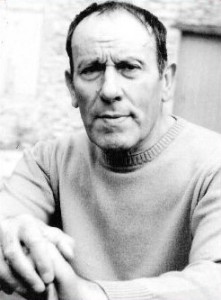
 |
| René Char |
“The poet is that part of man rebellious to calculated projects.”
—René Char, from his preface to Furor and Mystery (1948).
_____________________________
*Viz., con artists like Kenneth Goldsmith: “I will refer to the kind of writing in which I am involved as conceptual writing. In conceptual writing the idea or concept is the most important aspect of the work. When an author uses a conceptual form of writing, it means that all of the planning and decisions are made beforehand and the execution is a perfunctory affair.”

 Joseph Hutchison, Colorado Poet Laureate 2014-2019, has published 20 collections of poems and edited or co-edited three poetry anthologies. He currently directs two master’s-level programs for University College at the University of Denver: Professional Creative Writing and Arts & Culture Management. Joe lives with his wife, Melody Madonna, in the mountains southwest of Denver, Colorado, the city where he was born.
Joseph Hutchison, Colorado Poet Laureate 2014-2019, has published 20 collections of poems and edited or co-edited three poetry anthologies. He currently directs two master’s-level programs for University College at the University of Denver: Professional Creative Writing and Arts & Culture Management. Joe lives with his wife, Melody Madonna, in the mountains southwest of Denver, Colorado, the city where he was born. 










And speaking of manifestoes…<br /><br />http://www.flashpointmag.com/bakman.htm
"lazy collectors and purveyors of … info-detritus," yes! I understand how this kind of thing propagates; what I fail to understand is how these info-detritus addicts secure positions at prestigious institutions of lower (oops) learning. Does anyone read their pathetic manifestoes? Does anyone sit in on their classes? There are bigger mysteries, of course, but this (for me) is right up
Here's another "contra conceptual" from John Latta's recent post at "Isola di Rifiuti":<br /><br />"Girdings up, readjustments. Looking about at the commonplaces of today’s story’d renegades, the lazy collectors and purveyors of the info-detritus, page by page (call it “conceptual”). <br /><br />Priceless, eh?
If the execution is perfunctory, one wonders: Why bother? I've always thought that the poem tells me what it wants: I don't tell it. When I try, the poem doesn't listen very well, but goes on about its business. Isn't that, to some extent, what makes it poetry?
well<br /><br />I'm glad as he says/admits: "it works for me"<br /><br />not me … him…<br /><br />heck<br /><br />I can't (kant) separate my subject from my object<br /> con septually<br /> or care to or per-plan to any-other-way<br /> differentiate<br />punctuate or eve pre-functuate the "affair"<br